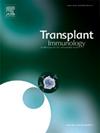Successful use of cemiplimab in a high immunologic risk kidney transplant recipient with metastatic squamous cell carcinoma
IF 1.4
4区 医学
Q4 IMMUNOLOGY
引用次数: 0
Abstract
The widespread use of immunotherapy in the management of cancers has led to improved overall survival and progression free survival. Due to increased risk of allograft rejection, organ transplant recipients are often excluded in clinical trials or offered immunotherapy only as salvage therapy. We report a case of successful use of Cemiplimab, an immune checkpoint inhibitor, in a high immunologic risk kidney transplant recipient who was diagnosed with metastatic squamous cell carcinoma (SCC) twenty-five months post-transplant. He started Cemiplimab five months post diagnosis of SCC, as third line therapy, after demonstrating progression of metastatic skull-based disease on prior lines of therapy. His maintenance immunosuppression was changed from triple immunosuppression with tacrolimus, mycophenolate and prednisone to sirolimus with a high trough target of 10–15 ng/mL and steroid therapy. He tolerated the high sirolimus trough and continued on Cemiplimab for six months with clinically stable allograft function and a good quality of life. Notably, he demonstrated response of his previously chemotherapy refractory metastatic disease. He passed away from radiation necrosis of the brain at sixty-eight months post-transplant.
在转移性鳞状细胞癌的高免疫风险肾移植受者中成功使用西米单抗。
免疫疗法在癌症治疗中的广泛应用提高了总生存期和无进展生存期。由于同种异体移植排斥反应的风险增加,器官移植受者经常被排除在临床试验中,或者只将免疫治疗作为补救性治疗。我们报告了一例成功使用免疫检查点抑制剂Cemiplimab治疗移植后25个月诊断为转移性鳞状细胞癌的高免疫风险肾移植受者的病例。在诊断为SCC后5个月,在先前的治疗线显示转移性颅底疾病进展后,他开始使用塞米普利单抗作为三线治疗。他的维持性免疫抑制由他克莫司、麦考酚酸酯和强的松三联免疫抑制改为西罗莫司,高谷靶10-15 ng/mL和类固醇治疗。他耐受高剂量西罗莫司,并继续使用西米单抗6个月,临床同种异体移植功能稳定,生活质量良好。值得注意的是,他对之前的化疗难治性转移性疾病表现出了反应。移植后68个月,他死于脑部放射性坏死。
本文章由计算机程序翻译,如有差异,请以英文原文为准。
求助全文
约1分钟内获得全文
求助全文
来源期刊

Transplant immunology
医学-免疫学
CiteScore
2.10
自引率
13.30%
发文量
198
审稿时长
48 days
期刊介绍:
Transplant Immunology will publish up-to-date information on all aspects of the broad field it encompasses. The journal will be directed at (basic) scientists, tissue typers, transplant physicians and surgeons, and research and data on all immunological aspects of organ-, tissue- and (haematopoietic) stem cell transplantation are of potential interest to the readers of Transplant Immunology. Original papers, Review articles and Hypotheses will be considered for publication and submitted manuscripts will be rapidly peer-reviewed and published. They will be judged on the basis of scientific merit, originality, timeliness and quality.
 求助内容:
求助内容: 应助结果提醒方式:
应助结果提醒方式:


